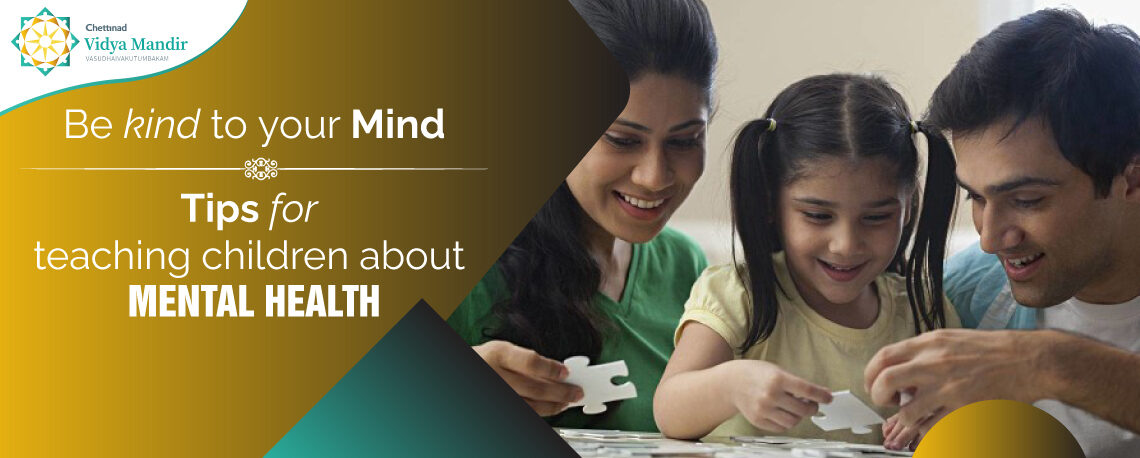Tips for teaching children about mental health
Any parent will tell you that their biggest wish for their child is for him or her to be healthy and happy. That’s why they constantly remind their children to brush their teeth and hurry them to music lessons and sports practice every week or day!
healthy, mental health is usually, if not always, disregarded.Unfortunately, even though we teach our kids how to be physically strong and
However, it is something that should not be ignored now more than ever. Because caring for one’s mental health is an essential skill that everyone, whether an adult or a child, should possess.
What exactly is mental health for children?
Mental health refers to a child’s thoughts and feelings about themselves and their environment. This has an impact on how they handle life’s challenges as they grow up.
Mental health is a vital component of a child’s healthy growth. It supports children in developing positive social, emotional, behavioural, intellectual, and communication skills. Additionally, it lays the foundation for a lifetime of improved mental health and well-being.
Poor mental health can have a negative impact on our physical health, increasing our risk of developing certain diseases.
So how does someone who has good mental health appear? Are they always in a good mood?
Certainly not. A person with good mental health may not always be cheerful; because mental health is a spectrum. They can only manage the ups and downs that life brings them. Instead of feeling overwhelmed or unprepared to handle negative thoughts and emotions, they may identify them, accept them, and work through them.
And, unfortunately, we can’t protect our children all through their lives. They’ll confront their own challenges in life as they grow older, and it may appear that there’s nothing we can do to protect them.
However, there is one thing we can do for them—teach them how to look after their mental health. That is a gift that is truly invaluable.
The following tools can be excellent ways to help support your child’s mental well-being.
Model good habits and lead by example:
It can be intimidating to realize you’re such a strong role model for your child. Children, however, can also pick up on our good habits, just as they may do with our negative ones. So, what if we took advantage of it? If you communicate your feelings calmly and confidently and take efforts to care for your mental health, your children are likely to emulate you.
Watch for behaviour changes:
Children’s changing behaviour as they progress through developmental stages is completely normal. If you find your child becoming more reclusive or separated from their friends, family, or routine, it could be an indication that they’re dealing with a circumstance or feeling they are unable to resolve on their own. Check-in with your child and let them know you’re available for them in any way they require.
Keep communication open and honest:
It’s essential that your child understands that they can come to you with any problem or concern and that they will be accepted and listened to with love and support. Let them know that you are available and listen to them without judgment.
Talk about emotions and feelings regularly:
Children learn a lot from watching their parents, including how to express and regulate their emotions. When interacting with your child, instead of simply expressing your day was “good” or “OK,” attempt to explain the many feelings you experienced throughout the day. Tell them about a time when you were stressed and how you dealt with your feelings in that situation. This teaches children that these feelings are normal, gives them insight on how to proceed with them, and equips them with the vocabulary to discuss a larger spectrum of emotions that affect them.
Talk to them about mental health:
Educating children about other people’s challenges will help them develop empathy and erase the stigma associated with mental illness. What could be more fulfilling as a parent than educating your child on how to be a more compassionate, sensitive, and informed person?
Coping skills:
To assist children in controlling their emotions, you can teach them a range of coping mechanisms. For instance, you can encourage them to use art to communicate their emotions. This would give a secure space for them to sort through their feelings and make sense of what they’re experiencing.
Teaching breathing techniques and meditation to slightly older kids can also be beneficial.
Get professional help if needed:
As a parent, you must be able to recognize when your child requires help. Trying to manage your child’s conduct or respond appropriately to their emotions can be stressful or unpleasant at times. Don’t hesitate to seek out and accept help; it will be beneficial to both you and your child.

